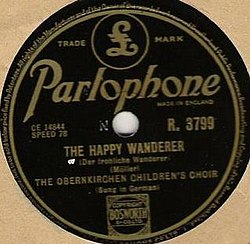 |
| The UUCSV choir singing The Happy Wanderer |
 |
| Accompanied and led by Music Director Annelinde Metzner |
 |
| The occasion was a talk by Willow Allen about her spiritual and physical trek along the Appalachian Trail |
- The Happy Wanderer(s)
The original recording by the Obernkirchen Children's Choir
"The Happy Wanderer" ("Der fröhliche Wanderer" or "Mein Vater war ein Wandersmann") is a popular song. The original text was written by Florenz Friedrich Sigismund (1788-1857).[1][2] The present tune was composed by Friedrich-Wilhelm Möller shortly after World War II. It is often mistaken for a German folk song, but it is actually an original composition. His sister Edith Möller conducted a small amateur children's and youth choir in Schaumburg County, Northern Germany, internationally named Obernkirchen Children's Choir, in Germany named Schaumburger Märchensänger.[3] She adapted Sigismund's words for her choir.[1]
In 1953 a BBC radio broadcast of the choir's winning performance at the Llangollen International Musical Eisteddfod turned the song into an instant hit. On January 22, 1954, the song entered the UK singles chart and stayed on the chart—only a Top 12 at the time—for 26 non-consecutive weeks, peaking at Number 2 (for five consecutive weeks). With the BBC's strong international influence "The Happy Wanderer" turned up everywhere, e.g., as the winning song of the 1955 calypso road-march season of the Trinidad Carnival. People protested after this event and complained that only calypsoes should be chosen over foreign music.
The amateur choir, many of whose original members were war orphans, turned into an unlikely international phenomenon in the following years. The group performed on many international tours under the name Obernkirchen Children's Choir and recorded several albums. They made two appearances on The Ed Sullivan Show (November 29, 1964, and December 11, 1966).
Die Isarspatzen, Herbert Beckh und das Tanzorchester des Bayerischen Rundfunks have also recorded a German version. That version was made in Munich on June 16, 1954. It was released by Electrola Records as catalog number EG 8073.
The song's German lyrics have been translated into several languages, and it has since become a choir classic. The first adaptation into another language was done by a Belgian woman, Andrée Mazy, who came up with versions in Dutch-Flemish and French.[4] Since in Dutch folk songs "valderi-valdera" (pronounced "falderi-faldera") is more common than the German "falleri-fallera", she used the Dutch model in both versions.
When Antonia Ridge was writing the English lyrics,[5] she became acquainted with the French version of the song, with "valderi-valdera", pronounced with a true soft /v/ instead of the voiceless /f/, and borrowed it over into the English version mainly for euphonic reasons (less military sounding).[6]
Milton DeLugg wrote a noted arrangement, and is sometimes incorrectly credited as the composer of the song.
A number of English-language sources credit Edith Möller and Florenz Siegesmund with writing the words, the implication being (apparently) that they were written at the same time as the tune. However, the German sources all credit the original words to either Friedrich Sigismund,[7][8] F. Sigismund,[9] or Florenz Friedrich Sigismund[2] and give the dates as either 1788-1857 or early 19th century.[10] All German sources agree that the words to the popular version were adapted by Edith Möller.
******************
I never got a good answer as to the meaning of Varderi - Valdera. There is a region in Italy near Pisa named Valdera. Not likely to be included in this German song.
I do love how it's an international favorite of hikers, along with (groan) Kumbaya!
Thanks for reading today!
Here's a quote, since I forgot one yesterday:
Do not be small minded. Do not pray for gourds and pumpkins
from God, when you should be asking for pure love and pure knowledge to dawn
within every heart. Sri Ramakrishna Paramahamsa

No comments:
Post a Comment
Thanks for your comments. Moderation is off (so we'll be checking for spam!)